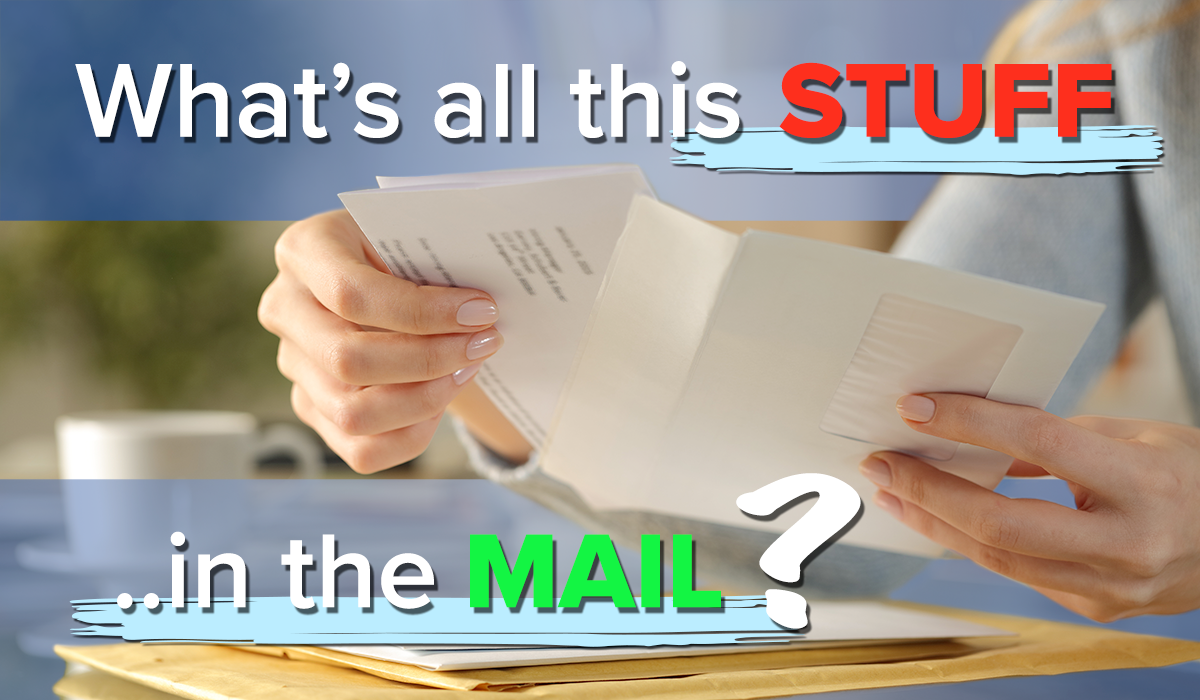Here's something you probably didn't know would happen after buying a home: paper snail mail will begin to flood your physical mailbox - IRL. You might panic just a bit, thinking, "What's happening here? How do these companies know my name AND my new address?!"
You might find yourself grabbing all of it from the mailbox, walking straight to the garbage, and almost dropping it inside. Except, you stop, just before you open your hand to let it all fall, and think, "Wait - is this ALL junk? Is any of this legit? Do I need to ACT NOW, as the bold print demands?"
Well, we've got answers for you, starting with why you're getting this junk mail. Then we'll share how all these companies know your name AND your brand new address.
And what you can do to stop the flood of snail mail.
THE SELLING OF YOUR INFORMATION
It's a little unsettling to think about the number of companies that have your new address. But don't panic - there's nothing sinister about it - just old-fashioned direct marketing. Even in the era of digital/online marketing - snail mail marketing is still a big thing.
If a company's perfect customer for their product is a new homeowner - they're going to want to target all of their sales efforts on that group of people. So, as soon as you close on your new home - you turn into their ideal customer.
Companies have been purchasing lists of new residents for decades. Local businesses are looking to sell their landscaping, dry cleaning, home security, and house cleaning services, for example, to new homeowners. They buy lists of new residents in certain zip codes, or specific neighborhoods, from many sources, including direct mail companies.
But did you know that one source to buy consumer information comes from the major credit bureaus? Yes, when your mortgage lender pulls your credit report, the credit bureaus know you're looking for a home loan. And one revenue source for the credit bureaus is selling lists to direct marketing companies, mortgage companies, and many other businesses.
Did you find it odd that other mortgage companies began to reach out to you at the start of your mortgage journey? How did they know? Well, they buy lists of prospects from the credit bureaus targeting buyers at the beginning of their mortgage search.
It might be annoying to be bombarded by solicitations at a time when you're already overwhelmed by the home buying process - but it's not illegal to sell this information. But that's not the only way companies can access your personal information.
YOUR PUBLIC RECORDS
Once the deed for your new home is recorded with the county - it's a public record. The address of your home and the name of the individual(s) that own it are available. So is the name of your mortgage lender, the loan amount, and the actual loan number.
The companies that gather this information to solicit your business can be pretty clever. They come up with endlessly creative ways to entice new homeowners to engage with their company. That's why some of the mail you receive may give you pause as you stand over your wastebasket. "Is it from my lender, and do I need to do something with it?"
We can't list all the types of deceptive junk mail you might receive - but there are some common marketing scams. One is from companies offering to set your mortgage up on autopay or biweekly payments for a fee. Don't fall for this one - lenders can set that up for free.
Another typical "offer" is to have a company send you the complete listing of your home as it appeared on Zillow. Not something worth spending money on - you can grab all the information with a few mouse clicks.
If you receive an offer to record your deed for a fee - well, that was done by the escrow company that handled your closing.
And your instinct to hesitate before you toss all that mail in the garbage was a good one. A few pieces of mail will be important and legit - like:
- Your Title Insurance policy
- A copy of your recorded deed
- The company servicing your mortgage's address to mail your payment
- A supplemental property tax bill
Since legitimate and junk mail may look the same, as marketers try to make their mailings look like they're from your lender, make sure before you toss. If you're not 100% certain it's junk or legit - reach out to your Point Equity loan officer to make sure.
MORTGAGE PROTECTION INSURANCE
A lot of the mail you receive will offer types of insurance, but the most common is mortgage protection insurance. This is not something you need to carry; your mortgage lender does not sell it, and buying it is entirely up to you.
What is Mortgage Protection Insurance? It offers a death benefit that will pay off the mortgage balance for your family if you die. It also provides a "living benefit" that covers the mortgage payments if you become unable to work due to a disability, long-term illness, or unemployment.
There's even a money-back version that repays premiums if you didn't use the coverage after the end of its term. And if that all sounds like a form of life insurance - well, it is just that with some distinct differences.
Do you need to purchase mortgage protection insurance? No, you don't but if this type of insurance is interesting to you based on your situation - talk to your insurance provider before deciding to purchase.
HOW TO STOP THE JUNK MAIL
There are several ways to stop and control the flow of this junk mail. By taking this action, you'll invest some time and effort, but you'll escape the mountains of paper. And the mail you do receive will likely be legitimate items.
You can register at this website for any pre-screened credit offers (new credit cards) or solicitations from other mortgage lenders: https://www.optoutprescreen.com/ or call 888-5-OPTOUT (888-567-8688.) Registering to stop sharing your credit information for marketing purposes here covers you for five years. It's possible to be permanently removed by printing the form on the website and mailing it in.
For many marketing mail pieces, you can opt-out at the website for the direct marketing association - https://dmachoice.org/. It costs $2 for ten years of coverage.
If you're also getting lots of catalogs, save them and go to the website https://catalogchoice.org/. This is non-profit, and you'll need to sign up for the service and have the physical catalogs to opt out.
And, finally, you may be surprised by the delivery of a Yellowpages Directory on your new front porch. Who wants or needs the yellow pages in the time of smartphones? Put a stop to those; go to https://www.yellowpagesoptout.com/.
Of course, you can always sort the junk mail, pull out the real mail you need, and toss the rest. But at least now you know how they got your address, what you should keep - and some long-term and permanent ways to shut down new homeowners' junk mail.





.png)


